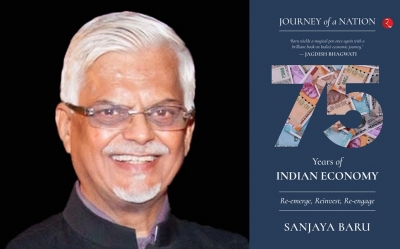Revival of growth, creating new employment opportunities remain a priority: Sanjaya Baru (Book Review)
By IANS | Published: August 6, 2022 11:36 AM2022-08-06T11:36:05+5:302022-08-06T11:50:46+5:30
New Delhi, Aug 6 The first two decades of the 21st century witnessed a significant transformation of Indias ...

Revival of growth, creating new employment opportunities remain a priority: Sanjaya Baru (Book Review)
New Delhi, Aug 6 The first two decades of the 21st century witnessed a significant transformation of Indias economy but the country entered the 75th year of Independence with "grave concerns" about poverty, unemployment, inflation and loss of global competitiveness, while the Covid-19 pandemic and the contingency measures it entailed "cast a long shadow" on economic growth even as we "already see the kind of changes" needed on the way forward, says a new book by political commentator and policy analyst Sanjaya Baru.
"India entered the 75th year of Independence still carrying gave concerns about poverty, unemployment, inflation and loss of global competitiveness. Despite these setbacks, in terms of purchasing power parity, India is the world's third largest economy behind the United States and China. In US dollar terms, it is now the world's sixth largest economy behind the US, China, Japan, Germany and the United Kingdom," Baru, who was Prime Minster Manmohan Singh's media advisor from 2004 to 2008, writes in "75 Years of Indian Economy".
The book, published by Rupa under the broad title "Journey of a Nation" and subtitled "Re-emerge, Reinvest, Re-engage", says that while "the past does not offer a perfect roadmap to the future", the next 75 years "will be very different, and we already see the kind of changes we need to make to be able to make the journey forward so that we are able to ensure the well-being and livelihood security of all and unleash the creativity of every citizen of our democratic republic, irrespective of caste, class, religion or region".
"A revival of growth and the creation of new employment opportunities will remain a priority for any government," Baru, who has served as Associate Editor of The Economic Times and The Times of India, as the Secretary General of industry lobby FICCI and as Director for Geo-Economics and Strategy at London's International Institute of Strategic Studies, maintains.
Written for the millennial generation "who will live through most of the 21st century", the book traces the ideas and events that have shaped India's economic policy, transforming a feudal, agrarian economy into a modern, industrial and service-based one. Harkening to the role played by the drain of wealth under British colonial rule on nationalist thinking and post-Independence policy, Baru explains how Indian political and intellectual leaders influenced policy on agrarian relations, industrialisation and the creation of a knowledge-based economy. He also offers a ringside view of the historic 1991 reform programme and its role in defining India's development trajectory in the 21st century.
The "real contribution" of Prime Minister P.V. Narasimha Rao
Disclaimer: This post has been auto-published from an agency feed without any modifications to the text and has not been reviewed by an editor
Open in app